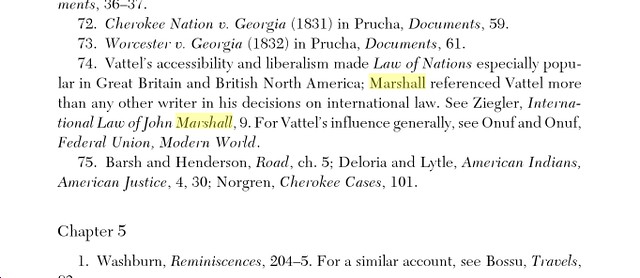Since they seem to be the rule in your methodology, I figured "When in Rome..."
Actually it's an old logical game, and i'm not surprised you don't recognize it.
"Natural born Subject" is to "Natural Born Citizen" what "King" is to "President." Thanks for playing. Better luck next time.
You dodged my point entirely. Massachusetts DID use the terms NBC and NBS interchangeably. And the Vermont Constitution DID term the residents "natural born subjects." Though neither state spoke of the resisents having a "king."
And there is a point to this? They did have a King, and then they didn't. Subsequent referral to "subject" was custom and habit. Thomas Jefferson himself, while writing the Declaration of Independence, wrote the word "Subject", then rubbed it out and wrote the word "Citizen" over the top of it. Once again, you have some sort of point?

You confuse two terms being used analogously and instead force an identicality that no one then ascribed to them. Thus, your lame attempt at reductio ad absurdum fails.
I merely demonstrated that the terms are analogous, not equivalent. Apparently the lesson got through for a change. The philosophical basis (and practice) of "Natural Born Subject" is VERY DIFFERENT than the philosophical basis of "Natural Born Citizen." Anyone with intellectual honesty would recognize that the founders would vehemenently reject the philosophical basis for being a "Subject" as opposed to being a citizen. How about you let Sir Michael Foster put you some fkn' knowledge?
Sir Michael Foster:
Sect. 1. With regard to Natural-born Subjects there can be no Doubt. They owe Allegiance to the Crown at all Times and in all Places. This is what We call Natural Allegiance, in Contradistinction to that which is Local. The Duty of Allegiance, whether Natural or Local, is founded in the Relation the Person standeth in to the Crown, and in the Privileges He deriveth from that Relation. Local Allegiance is founded in the Protection a Foreigner enjoyeth for his Person, his Family or Effects during his Residence here; and it Ceaseth whenever He withdraweth with his Family and Effects. Natural Allegiance is founded in the Relation every Man standeth in to the Crown considered as the Head of that Society whereof He is born a Member; and on the peculiar Privileges He deriveth from that Relation, which are with great Propriety called his Birthright. This Birthright nothing but his own Demerit can deprive Him of; it is Indefeasible and perpetual. And consequently the Duty of Allegiance which ariseth out of it, and is inseperably Connected with it, is in Consideration of Law likewise Unalienable and Perpetual.
The Analogy between Subject and Citizen and King and President is a lot closer than feels comfortable to you. This principle of English Law is obviously NOT the "Natural Law" to which the Founders Refer. If they followed THAT version of "Natural Law", they could never be independent.
Given you ducked my points on Blackstone, and given your alternative quotes don't negate his point that "the chidrens of aliens born in England are, generally speaking, natural born subjects,"
I earlier wanted to speak on Blackstone, but didn't feel it was worth the time or space. I'll address it now. That Blackstone uses the qualifier "generally speaking" fits quite nicely with the quotes of English Law from Mathew Bacon and Giles Jacob.
Your little group of deludees will simply argue that Blackstone's "generally speaking" qualifier obviously refers to the children of Ambassadors and such, but looking elsewhere in English law, it becomes quite apparent that Blackstone's comment refers to Denizens, who are in a halfway state between full Citizen and Alien.
It further ignores the point that the stratified English Society might have REFERRED to Native born Alien Children as "Natural Born Subjects" (Meaning The King has a claim on their servitude) but in practice they treated them quite differently from those born to English Parents, and they most certainly DID NOT allow them to rule England.
I'll take that wager. Blackstone was on most everyone's desk who had anything to do with law in America.
For Civil and Criminal law. For International law? (The only body of law which actually deals with citizenship.) Not so much. As Civil and Criminal law takes up the vast bulk of any legal system, it is understandable that he would be an oft cited and useful reference. But to what Law Authority did John Marshall turn when the issue was International Law?
A Strange Likeness : Becoming Red and White in Eighteenth-Century North America

From Ziegler's "International law of John Marshall"

And his statement is crystal clear.
Perhaps not so much as you seem to think.
"NBC" and "NBS" were often used interchangeably in the pre-Framing period, and the terms on their face speak to a status via/at birth. Contrary to your STUPID insistence, it does not follow that they thereby had to insist on equivalency between "citizen" and "English subject" in every respect.
Au contraire, it is my insistence that they DID NOT insist on equivalency in every respect, or indeed, in any respect. The terms were analogous, but definitely not equivalent. They were two very different forms of Government, based on two very different principles of "natural law." The English version of it is incompatible with America's Independence, so it is axiomatic that THAT version was rejected by the founders.
Analgous. NOT identical in all respects. If you stop stumbling on that point of confusion, your argument may start to appear less inept than it does at present. Or you can continue to barricade yourself in Wonderland and keep regurgitatng arguments that make sense to few others but you.
One of us is certainly stumbling in wonderland, but I have no concern that it is I.
Done for the night. I have more important things to do in the morning.